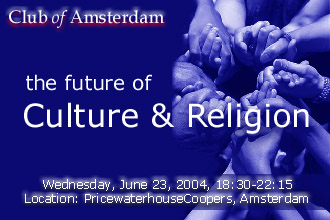
Q&A with Jacques Janssen

Prof. Jacques Janssen, Professor of Cultural Psychology and the Psychology of Religion, section of cultural psychology and psychology of religion, University of Nijmegen
Club of Amsterdam: Does religion need its own social base in the support of one class or social grouping in order to survive?
Jacques Janssen: Religions will survive as institutions allied with special groups: Christianity, Buddhism etcetera. The number of religious institutions will increase, the number of adherents for each institution will decrease (sectarisation). At the same time these institutions function as deliverers of religious products on an existential market and a lot of people who are not members of religious institutions ‘buy’ these products.
Rodney Stark, a sociologist of religion, wrote: “For nearly three centuries, social scientists and assorted Western intellectuals have been promising the end of religion…. Modernization is seen as the causal engine dragging the gods into retirement…”. Is the scientific faith in the theory of secularization just wishful thinking?
Jacques Janssen: Religion as an institution and religion as a basic human need are often confused. Of course institutions can change and even disappear. Basic human needs will stay and will eventually be realized in a different way. When religion is strictly defined as belief in a God (e.g. Pascal Boyer) religion is evolutionary seen as a frill, just like art: we have the capacity to do it, and we like it, but is avoidable. Boyer defines religion as “a probably, although by no means inevitable by-product of the normal operation of human cognition”. When religion is defined more generally as a basic need to understand and control existential problems, for instance the fear of death (as in the terror management theory), then it is seen as a direct result of evolution and necessary for survival.
“Considering Europe, we can see that many individuals seem to set up some kind of “religious patchwork,” using various existing resources which they compose according to their own needs, views, and experiences.” [Liliane Voye] Is the coming religious age a private one?
Jacques Janssen: Indeed individualization is an important phenomenon. But this does not mean that institutions are superfluous in an individualized society. Institutions are becoming more flexible. A good example is the temp agency. People have the idea that they just choose their job. They want to change jobs. This is highly individualised behaviour, but it is at the same time guided by an institution. The prevailing idea is that people who work for a temp agency are free. In my opinion this is ideology, but it works: people think they are free. To survive in modern culture religious institutions have to become more flexible.
Jacques Janssen speaks at our Club of Amsterdam Event about
‘the future of Culture & Religion‘ on Wednesday, June 23, 18:30-22:15!
about the future of Culture & Religion

Religion and state in the candidate countries to the European Union
by Balazs Schanda
In my paper I shall focus on the Central European region – Cyprus and Malta are in a very different situation from these countries. […]
All the candidate countries of Central-Eastern Europe suffered communist governance for over four decades. Religious freedom was curtailed in them all. Certainly there were significant differences between countries and periods. Probably believers in the former Soviet Union suffered the most. The record for Czechoslovakia is definitely worse than that for Poland. Practices varied from open persecution to administrative harassment and discrimination with one common element: there was no religious freedom as such.

Religious Freedom and New Religious Movements in Europe
by Merudevi Dasi
Everyone has the right to freedom of thought, conscience and religion. This is guaranteed in several legal documents, most importantly in Article 18 of the Universal Declaration of Human Rights (1948) (UDHR) and in the International Covenant on Civil and Political Rights (ICCPR), and Article 9 of the European Convention on Human Rights (ECHR). These articles allow us to hold any beliefs we desire, whether they are theistic, non-theistic or atheistic. The right to manifest these freedoms is only restricted in order to protect the fundamental rights of others.
The emergence of ‘new religious movements’ (NRMs) in the West since the 1960s has put these articles to the test. Are all expressions of faith acceptable in our society, and how should we react to them? European countries have chosen to interpret freedom of religion and belief in diverse ways, and have adopted different strategies on how to deal with these NRMs. In this article we look at some of the developments in Europe in this regard, particularly in France. France is by no means unique in its approach towards NRMs, but it is well ahead in introducing restrictive legislation against them.
News about the future

Machine Learning (ML)
Machine Learning (ML) is a general paradigm aiming at the estimation of the parameters of an unobserved system given observed samples (also called examples). As such, ML can replace and/or supplement the traditional development of hand-coded rule-based systems. A direct consequence is that ML can be used to acquire useful lexical information, since such information is usually obtained through rule application. Thus, ML is often seen as a solution to the data acquisition bottleneck.
Xerox Research Centre Europe (XRCE) focuses on three main areas at the very heart of textual information access, and in which ML plays an important role. The first one deals with the automatic acquisition of relevant textual units and their typing according to a given set of types. The second one deals with the automatic acquisition of relevant links between these units. Lastly, the third one deals with the general problem of text categorization and clustering.

Scaling up Drinking Water Services
By Junaid K. Ahmad, David Savage, and Vivek Srivastava
Worldwide there have been many successes in the delivery of drinking water services. The reform of Phnom Penh’s public utility in Cambodia and Cartaghena’s water privatization in Colombia are outstanding examples. But, there are also cases of dramatic failures – Cochabamba, Bolivia, or Bangladesh’s arsenic crisis. These successes and failures offer a host of lessons for reformers, but one stands out in particular: the success of service delivery depends on whether institutions of service provision are accountable to citizens. The challenge is thus “not to fix the pipes, but to fix the institutions that fix the pipes.” [World Bank: Development OUTREACH, Spring 2004]
Questionnaire about ‘the future of Architecture’.
| At our recent Club of Amsterdam evening about ‘the future of Architecture‘ we asked the audience some questions: |
| 1. Do you think current architecture is exciting? |
| 64 % yes 36 % no |
| 2. Should a future architect have a different profile? |
| 73 % yes 9 % no |
| 3. Do you think architects nowadays can show their creativity? |
| 73 % yes 18 % no |
| 4. Is computational architecture going to improve quality of living? |
| 82 % yes 18 % no |
| 5. Would you support a more user centric design of housing supported by computational architecture? |
| 100 % yes 0 % no |
| 6. Do you think computational architecture will improve design creativity? |
| 91 % yes 0 % no |
| 7. Would you be willing to pay more for a house if it is designed using upcoming computational design techniques? |
| 45 % yes 55 % no |
Recommended Book

Europe Without Borders: Remapping Territory, Citizenship, and Identity in a Transnational Age
by Mabel Berezin (Editor), Martin Schain (Editor), John Agnew (Contributor)
The creation of the European Union in 1992 reflected new economic, political, and cultural realities on the continent. The dissolution of national borders and the easing of transit restrictions on people and goods with Europe, have contributed to a radical rethinking of such basic concepts as national sovereignty and citizenship. In Europe without Boundaries, Mabel Berezin and Martin Schain bring together leading experts from the fields sociology, political science, geography, psychology, and anthropology to examine the intersection of identity and territory in the new Europe.
In this boldly interdisciplinary effort about the impact of reconfiguration, contributors address such topics as how Europeans now see themselves in relation to national identity, whether they identify themselves as citizens of a particular country or as members of a larger sociopolitical entity, how both natives and immigrants experience national and transnational identity at the local level, and the impact of globalization on national culture and the idea of the nation-state. Theoretically sophisticated and empirically informed, the essays explore an emerging global phenomenon that will have profound political, social, and economic consequences in both Europe and around the world.
Contributors: John Agnew, UCLA; Roland Axtmann, University of Aberdeen; Mabel Berezin, Cornell University; Neil Brenner, New York University; Craig Calhoun, New York University, President of the Social Science Research Council; Juan Diez-Medrano, University of California, San Diego; Roy Eidelson, University of Pennsylvania; Nicholas Entrikin, UCLA; Riva Kastoryano, Centre d’Etudes et de Recherches Internationales; Krishan Kumar, University of Virginia; Ian Lustick, University of Pennsylvania; Levent Soysal, New York University.
Supporter of the Club of Amsterdam event about ‘the future of Healthcare & Technology‘ on Wednesday, April 28, 2004 is:

Club of Amsterdam Round Table: Homme Heida

Homme Heida
Cultural behaviour
If you have endured five years of Sunday school and decide to become a drop out, than it doesn’t mean you are religious enough to enter real life. On the contrary it is likely that you have reached a point of no believe. All those holy stories become suddenly fairy tales and you are on longer capable of taking them seriously.
If more and more people have trouble with holy representatives of the all mighty who can produce thunder or walk on water or promise you at least seventy virgins after you die, that doesn’t mean religion becomes extinct. Not even when scientists and other intellectuals predict for centuries that rationality will be the absolute winner at the end.
If we must accept the fact that religious behaviour has survived the enlightenment and that we easily combine a heathen tree with a catholic crib, that doesn’t mean we are tolerant Christians. Getting on your knees five times a day bowing in the right direction does not convince every new generation you are right. Being able to empty your mind in concentration will ease the tension but does not bring you prosperity.
Are we then lost in a spiral of idle convictions? Is there no way to escape from this ever so penetrating phenomenon we call religion, believe, faith or fate? If next to sand, water, air and fire, now information is a fifth element, cannot we expect that all peoples will learn from each other and take the rituals they like and add them to the tree, the crib, the mat on which they concentrate, bow or move as slowly as they possibly can? And is it not likely that we then no longer talk about religion, but just call it global cultural behaviour?
Club of Amsterdam Upcoming Events
| June 23, 2004 | the future of Culture & Religion |
| September 27, 2004 | NanoWater |
| January 26-28, 2005 | Summit for the Future 2005 |







Customer Reviews
Thanks for submitting your comment!